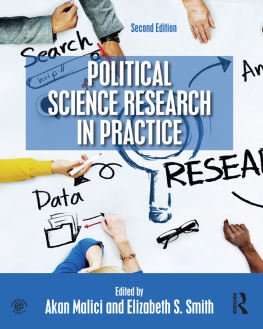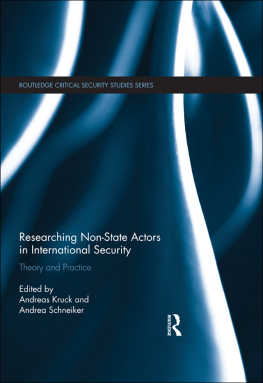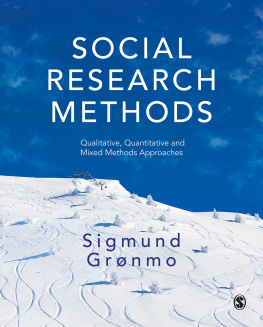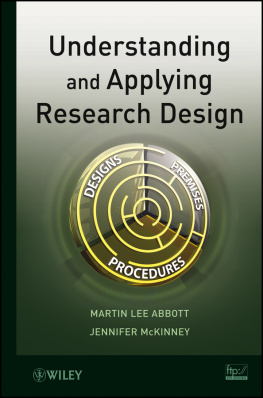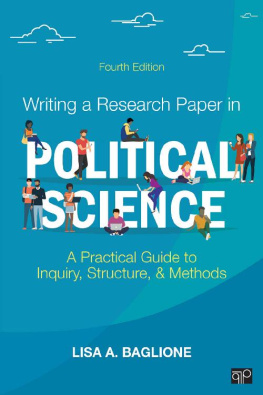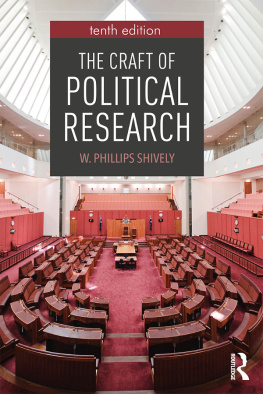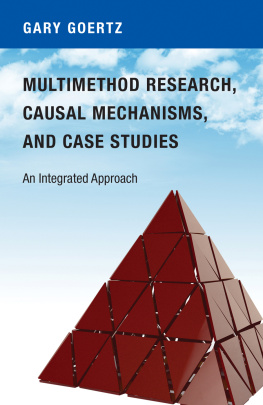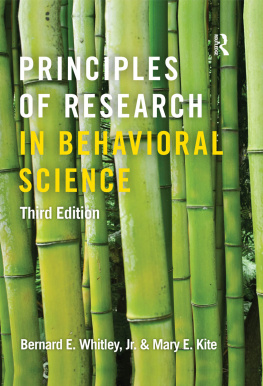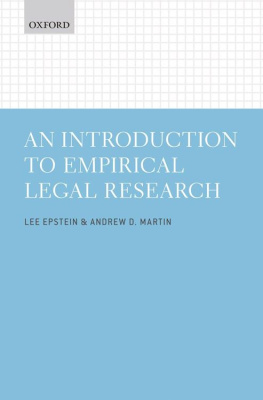We want to express our gratitude to Jenifer Knerr, Natalja Mortensen, Maria Landschoot and Zeev Sudry, our editorial partners at Routledge. We also want to thank our production editor Carrie Bell and our copyeditor Barbara Ball. They were all most wonderful professionals to work with. Their experience and expertise was invaluable in providing us with important guidance as we developed this book. We express our appreciation for the many careful reviewers commissioned by Routledge. Their attentive and engaged reading and extensive commentary on each chapter helped us in fundamental ways to create a better book. We want to thank our colleagues and contributors to this book who patiently worked with us to make our vision of a new kind of methodology book a reality. We also want to thank Furman University and the Department of Politics and International Affairs for the institutional support that we received. We thank our research and editorial assistant Noah Zimmermann. Last, but not least, we want to thank our students. It is from them that we learn to be ever better teachers. This book is dedicated to our students.
Akan Malici, Elizabeth S. Smith
Greenville, South Carolina
VST.Epub.contentReady(window, document); VST.cfiBase='/4';
C HAPTER 1
Why Do We Need a Science of Politics?
Elizabeth S. Smith and Akan Malici
C ONTENTS
In the late afternoon of election day, Tuesday, November 8, 2016, Nate Cohn, a political forecaster at The New York Times , had Hillary Clintons chances of winning the presidential election at 85 percent. The Trump campaign, signaling what many thought was their sense that he was going to lose, had denied media requests to film him and his team watching the returns. Early exit polls from that day had Clinton winning the electoral college with well above the requisite 270 votes. Conservative talk show host, Hugh Hewitt, a Trump voter himself, says about his prediction that Clinton would win, Ive never been this wrong. Clearly, he was not the only one.
Hillary Clinton was an experienced candidate who had served eight years in the Senate. She was twice elected by the people of the state of New York and sat on the Senate Armed Services Committee. She was then appointed Secretary of State, a position she held for four years. She lost the 2016 presidential election to a businessman who, unlike all past winning presidential candidates, had never held either political office or served in the military. A candidate who refused to release his tax returns and who during the course of his campaign was revealed on a tape from a few years earlier to have been bragging about sexually assaulting women using the crudest of terms. During the election, Donald Trump questioned the heroism of a former Vietnam POW in his own party
Given the stark differences in experience between the two candidates and the unprecedented features of Donald Trumps candidacy, most had assumed that though Hillary Clinton was a flawed candidate she would win the election. The questions on many minds in the days and months following the election was: How did Donald Trump win? And, why did the pollsters and pundits get it so wrong?
The high-school geometry teacher of one of us (Elizabeth Smith) once printed the word ASSUME on the board, and to our teenage amusement pointed out that when you ASSUME you are making an ass of u and me. Quite cleverly, she illustrated why in fact we need science. Our assumptions, our hunches, our general gut level feelings about the truths of the world are often proven wrong once we engage in careful, systematic and scientific analysis.
To know, according to Websters, is to have a clear perception or understanding of; to be sure or well informed about. There are various types of knowledge. Among them are religious knowledge, instinctual knowledge, common sense, scientific knowledge and so on. Although our book is about scientific knowledge we do want to point out that scientific knowledge is not necessarily better than the other types of knowledge. A mothers intuition about what to do with her unsettled child may trump the conclusions of scientific studies many times, for example. We value scientific knowledge, but we believe it is important to retain an appreciation also for other types of knowledge.
Science is a distinct type of knowledge and it stands apart from any other type of knowledge. The noun science originates from the Latin verb scire, and translates into knowing objectively, more specifically it is a way of knowing that is systematic, replicable, cumulative and falsifiable . In other words, scientific knowledge is based on careful and comprehensive observation of the data (systematic), collected and analyzed in such a way that others can reproduce the analysis (replicable). Scientific knowledge often evolves over time as multiple methodologies are being used and new data is examined ( cumulative ). Finally, scientific knowledge must be open to questioning and the possibility of being disproven by new data (falsifiable). The election of Donald Trump is one we can begin to understand more completely by looking at careful scientific analysis.
While there are many features of the 2016 presidential election scholars are still studying, a body of scholarship prior to the election provides important insight into Donald Trumps win. Headlines explaining Trumps victory immediately after the election suggest that Trump won because of the economy displaced workers in the new economy found Trumps message
However, scholarly research suggests that Trumps election can be better explained by examining the cultural stressors pushing voters toward populist appeals. Inglehart and Norris, for example, use multiple methodologies, and they provide compelling evidence that in both the US and Europe economic concerns of voters are trumped (pun intended) by fears raised by the perceived erosion of stature and identity, especially among traditional white voters, by increasing immigration, perceived loosening of traditional moral values and policies promoting gender and marriage equality.
A careful reading of the journalistic report cited by Luhby of CNN Money would raise red flags in a student such as yourself who is (soon to be) well trained in research methodology. Political scientists and other statisticians KNOW that the 49 percent to 46 percent difference in reported voter support for Trumps versus Clintons ability to handle the economy is well within the range of a typical margin of error , the difference between the sample and the population value when only a sample of people are surveyed. A margin of error is applied to the spread of the percentages reported, meaning that a +/3 percent margin of error applied to these percentages could mean that the actual poll results could be a virtual tie (49% to 49%) or as large a difference as 52 percent (49% + 3%) to 43 percent (46% 3%), or could be flipped (46% for Trump and 49% for Clinton). All of these statistics are very different in terms of potential electoral consequences, but all within the margin of error. In this particular case, the report presented on CNN Money is even more difficult to interpret accurately as, unlike in a scholarly, scientific study, no information is provided to the reader on how the data was collected (it was simply reported that it was a CNN exit poll), what the sample size and margin of error was, and whether it included a true random sample of the population , where no member of the population has any more chance than another of being included. Thus, this study is non-scientific in nature in large part because it is neither systematic, verifiable nor replicable , at least in regard to the form in which we the readers see it online.
But, we are still left with the question: Have political scientists, who point to the cultural influences on Trump voters, discovered the absolute truth about why Donald Trump won the 2016 election? Scientists would caution that scientific findings do not indicate absolute certainty if that is what we mean by truths. Instead, scientists tell us that any scientific knowledge is in fact tentative. Scientists have ensured themselves job security in the fact that it is an enterprise based on continual investigation of new data in new ways. As the evidence accumulates we certainly feel more confident about our conclusions, but any good scientist knows that their conclusions could one day be disproven by the accumulation of contrary scientific evidence. That is why most of us find science such fun! We are constantly exploring our surroundings, making careful observations and testing and re-testing our hunches in a search for knowledge and understanding of the complex and interesting world in which we live.

